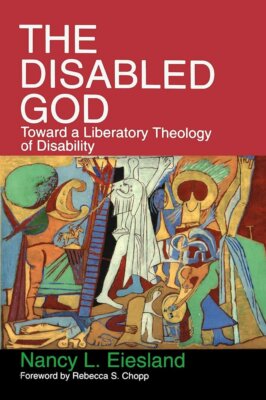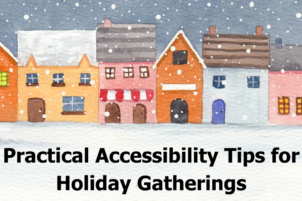 Thirty years have passed since the publication of Nancy Eiesland’s book “The Disabled God,” a pivotal work in Christian Disability Theology that envisions the resurrected Jesus as divinely disabled. Eiesland makes our bodies the starting point, encouraging us to live in relationship with our incarnational God who created disabled bodies in Their image and who desires for us to do what we can while listening to our body-mind-spirit’s limitations. As we approach Easter, let us wonder together about why the resurrected Jesus is disabled and what implications this good news has for our life together in community.
Thirty years have passed since the publication of Nancy Eiesland’s book “The Disabled God,” a pivotal work in Christian Disability Theology that envisions the resurrected Jesus as divinely disabled. Eiesland makes our bodies the starting point, encouraging us to live in relationship with our incarnational God who created disabled bodies in Their image and who desires for us to do what we can while listening to our body-mind-spirit’s limitations. As we approach Easter, let us wonder together about why the resurrected Jesus is disabled and what implications this good news has for our life together in community.
As a congenitally disabled person working in the United Methodist Church, I find in John 20 the most promising verse for disability justice. Here we observe the resurrected Jesus telling his disciple Thomas to put his finger on Jesus’ wounds and to put his hand into Jesus’ side. Jesus doesn’t just have the scars of crucifixion but remains disabled in his most sacred resurrected form. The Christian God feeds bodies, washes bodies, loves and is loved by bodies. In Jesus, our God knows what it is like to have a body, which necessarily means that our God knows what it is like to have aches and pains, hunger and thirst, desires and needs. Throughout the gospels Jesus cares for bodies – not perfect bodies, all bodies.
I see Thomas as proclaimer of abundantly good news because Thomas, in his wisdom, wants to see Jesus in his complex disabled embodiment. In our disability-fearing society, we tend to think of the resurrected Jesus as entirely refreshed. But Jesus did not rise in a perfect body. Jesus rose in a disabled body, marked by the trauma of imperial execution. He stood alongside disabled and otherwise marginalized people throughout his ministry and, in his disabled resurrected form, was accepted by his friends.
Disabled bodies are not the problem – not for Jesus and not now.
The problem is society which consistently disables us by perpetuating barriers. The problem is the institutional failure to provide access, too often viewing accommodations as an inconvenience. Whether we are the senior member who is experiencing hearing loss, the child with a developmental disability, the congregant navigating mental illness, the person not-yet-disabled, the parent using a mobility aid, or the clergyperson whose disability is non-apparent, the Disabled God calls us to act together so that all can fully participate in the life of the church.
How is this possible? We build community when we invite folx to rise in ways that are meaningful for them. We nurture belonging when we catch ourselves in our ableism, choosing to stop using disability as a metaphor and intentionally avoiding slang terms like “crazy” or “lame,” even when that means changing the lyrics of hymns. We bring about goodness when we ask people their stories and BELIEVE them. This Easter, center the lived disability experiences of your congregation and remember that we are holy, whole, and boundlessly loved, not despite the complexities of our bodies, but because of them.








Angela, nicely done!
That will preach! Love this Angela 🙂